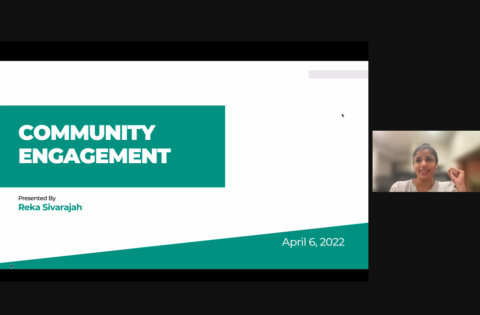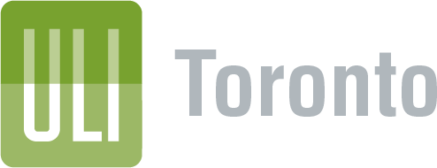Professional Development Tips to “Get Comfortable with Being Uncomfortable” – Reka Sivarajah
May 2, 2022

Reka Sivarajah – Member, Women’s Leadership Initiative & a Community Engagement Practitioner
Many of us have heard “get comfortable with being uncomfortable”. It is the idea that as part of accepting and embracing change, we need to step out of what’s comfortable and gravitate towards what’s uncomfortable. This mindset is one of the main sources of our career growth. These words are a reminder that I could make room for new learnings and experiences by making more room for “uncomfortable” situations in my career path. I do this by applying professional development approaches that work for me. Frankly, there is a lot to learn and experience in the development industry so I see myself doing these (and likely others) even a decade from now.
Here are some professional development tips to “get comfortable with being uncomfortable”:
- Volunteering: I’ve volunteered with various organizations in the planning and community engagement worlds. Overall, through my volunteer experiences, I had opportunities to be involved in unique initiatives that I otherwise would have missed. Right now, I volunteer with Women’s Leadership Initiative (WLI) Toronto, a committee part of the Urban Land Institute. I get positive energy through WLI because the women are inspiring and are really appreciative of one another. Who doesn’t want positivity and feel appreciated? As a member of WLI Toronto’s Communications Subcommittee, I work alongside very supportive and encouraging women city-builders. Specifically, I work on the Conversations with WLI podcast and maintain this WLI blog. I haven’t done these before but now, I’m able to say I have these experiences. For those looking to volunteer, I think it is easier to land a volunteer position after identifying a suitable organization and here are some suggestions to do that:
- Research organizations that have a vision aligning with your interests. Don’t forget to check out WLI Toronto! If you need help finding the right organization, review the LinkedIn profiles of those in your network – where are they volunteering?
- Talk to someone in the chosen organization to learn more about the organization and to identify volunteer positions. Sometimes, volunteer positions aren’t posted and frankly, one could be created to fit you and the organization’s needs. Without those conversations, you won’t know the absolute answer.
- Reach out to organizations you’re even remotely affiliated with (e.g. your alumni association). These organizations may have a role for you or be able to suggest fitting organizations.
- Mentorships: I have both informal and formal mentors. I can be myself and more importantly, vulnerable with them. I get candid advice and practical/actionable tips. For me, mentorship is another positive space that I look forward to being in. Mentorship is a reciprocal relationship so I hope my mentors are learning a thing or two from me. I reciprocate differently; I mentor others who are finding their paths in the development industry. Being vulnerable with my mentors and creating the space for my mentees to be vulnerable with me is an interesting challenge for me. If you’re looking for formal and informal mentorship, look into the following formal mentorship programs and approaches to get an informal mentor.
- ULI’s Mentorship Program
- Toronto Crew Mentorship Program
- Look within the organization you work for or are affiliated with
- Look through your LinkedIn connections (check out this article on How to Find a Mentor on LinkedIn)
- Events: Many events are online and that makes it easier to attend/participate. I definitely take advantage of the learning opportunities. I’ve met some of the panelists and other attendees and made efforts to connect with them after the event (use the event as a conversation starter; that’s one thing in common already). Also, the best part (everyone knows this) is that I could be in my sweat pants with a drink of my choice during these events. Others can’t see me unless I want to be seen. There is no shortage of virtual events so find the ones that interest you and leverage them.
- Positive online presence: We don’t promote ourselves enough. There’s a lot that could be said about the work we do at and outside the workplace. But, we don’t. I often shy away from writing about myself. But, recently I’ve become more active on LinkedIn. A former boss who I haven’t been in touch with for more than 10 years messaged me saying “Nice to see you come up in my LinkedIn feed. Congratulations on all you have achieved!”. If it weren’t for all my LinkedIn posts, I wouldn’t have shown up on her feed. Now, why is that important? Simple – people don’t know what they don’t know about you. So, what’s the best online platform and what can you share? I prefer LinkedIn because I see it as a professional network platform. Some suggestions from me on what to share:
- Share ideas, thoughts, updates about yourself, etc.
- Comment on or posts by individuals or organizations
- Write a post about an event you attended
- Openly recognize the good work of others
- Find and join a LinkedIn group(s) that is right for you

A presentation to students about my career trajectory
- Professional appearances: I had opportunities to be a guest lecturer and “expert” panelist where I shared my career trajectory and about the community engagement work I did and do. Through these opportunities, I’ve been able to reach a lot more professionals in the development industry and those interested in entering the development industry. Some of them asked me good questions that contributed to my learnings and reflections, which are important for my career growth. If you’re keen on doing guest lectures, talk to professors and instructors of courses that interest you; share how the students could benefit from hearing about your area of work and how you conduct your work.
- Written contributions: I’ve written articles for OPPI’s Y Magazine and blog post. I see them as a platform to share my insights with those in the development industry and start dialogues (directly or indirectly). There are several organizations and magazines that look for contributors. Where do you get your news about city-building? Could you contribute to those organizations?
- Professional networks: Much of the above professional development approaches lead to developing, maintaining and/or strengthening our professional networks. A strong professional network embodies the following benefits (there may be more). Many professionals continue to build their networks regardless of how well-seasoned they are (as they should).
- Gain knowledge and information (and information is power)
- Get fresh ideas
- Access to job opportunities
- Advance career
- Build confidence
- Raise our profile
- Get answers to questions
- Much more!
Although these approaches may appear to be separate approaches, they are often connected. Someone you meet at an event or volunteer with could become your mentor or you may be making a written contribution to an organization you volunteer with (that’s me writing this blog post for WLI!). Regardless, these are approaches that work for me and they could work for you too (or maybe not). I’m sure there are other approaches that I could tap into and I’ll discover them soon.
I would love to know how you’re “getting comfortable with being uncomfortable”. Send me a note on LinkedIn
